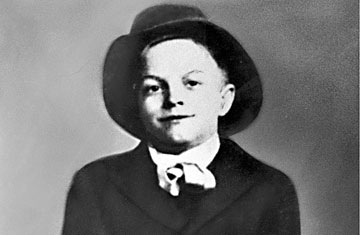
Bob Hope as a boy in Eltham, England
Among Bob Hope's many achievements during his unparalleled show-business career was to make it into Guinness World Records — as the most honored entertainer in history, with more than 2,000 awards, citations, honorary degrees, a Congressional Gold Medal, the Presidential Medal of Freedom and an undetermined number of holes in one. And the honors haven't stopped just because of his death, on July 27, 2003, at age 100. If you stop by the Library of Congress in Washington, D.C., you can see an exhibit celebrating Hope and political humor; it replaced another library exhibit on Hope and America's vaudeville tradition. Last year, Hope got his own postage stamp, and now the Ellis Island Immigration Museum has officially opened the Bob Hope Memorial Library.
The library was dedicated on a balmy fall Tuesday morning in New York City, as some 100 dignitaries, family members and old friends were ferried from lower Manhattan to Ellis Island. There, they heard yet another round of tributes for a comedy giant who couldn't get enough of them during his lifetime — but whose reputation among a younger generation (and even some of the older generation, who grew estranged from him during the controversial Vietnam years) has not worn well.
It may seem odd that this most quintessentially American entertainer, who worked harder and longer than anyone to entertain America's fighting men overseas, was an immigrant. He was born Leslie Townes Hope in Eltham, England, and sailed with his family to New York City when he was 4. They traveled in steerage on the S.S. Philadelphia, his mother dressing Les and his five brothers in three layers of underwear, socks and shirts — so they would have more to wear and she would have less to carry. The family settled in Cleveland, where Les made money selling newspapers and giving dance lessons before breaking into vaudeville (and changing his name to Bob), then moving on to Broadway, radio, motion pictures, television, Academy Award–show hosting — pushing his way to the top of each of those endeavors, the most broadly successful entertainer of the 20th century.
Bob's daughter Linda, now 70 and fervent keeper of the Hope flame, emceed the dedication ceremony, introducing the array of celebrities and friends in attendance, among them Yogi Berra, Arlene Dahl, Dick Cavett, two members of Congress, Turner Classic Movies maven Robert Osborne (who introduced a tribute to Hope's movie roles, one of three videos celebrating his life and work) and cabaret singer Michael Feinstein, who closed the proceedings with a heartfelt rendition of "Thanks for the Memory," Hope's signature number and certainly the most enduring and adaptable theme song in the annals of show business.
The memories couldn't quite stick to the script. "Can I do two minutes before Feinstein?" said Cavett, popping up in the audience just as Linda Hope was about to wrap up the event. He then recounted the story of seeing Hope for the first time, when the comedian went to Lincoln, Neb., and gave a dazzled seventh-grader his first taste of big-time show business. And he reminisced about one of their last encounters: a TV interview with an aging Hope, who told him that if he had it to do over again, he couldn't think of a single thing in his life that he would change. Not many people can honestly say that, Cavett mused. "In the whole history of the world, one man got to be Bob Hope," Cavett told him. "And you were that man." Not bad for a kid from steerage.
